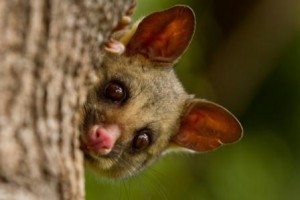 Unfortunately every day around Australia 1000’s of wild animals are injured, orphaned and killed. In a large majority of cases this is through the actions of humans and includes motor vehicle trauma, cat attacks from people not properly confining their pets and in some cases, straight animal abuse.
Unfortunately every day around Australia 1000’s of wild animals are injured, orphaned and killed. In a large majority of cases this is through the actions of humans and includes motor vehicle trauma, cat attacks from people not properly confining their pets and in some cases, straight animal abuse.
Much of this injured wildlife is found by members of the public. The following information is provided to assist these people help our wildlife.
Some general rules to follow when dealing with sick or injured wildlife are:
If you are unable to take the animal to a veterinary clinic then contact one of the following organisations who provide care for wildlife around Frankston and the Mornington Peninsula:
 AWARE (Australian Wildlife Assistance, Rescue and Education)
AWARE (Australian Wildlife Assistance, Rescue and Education)
Ph: 0412 433 727
www.awarewildlife.org.au
A volunteer wildlife rescue and rehabilitation organisation operating in Frankston and surrounding suburbs.
 Australian Animal Rescue
Australian Animal Rescue
Ph: 0430 883 083
www.australiananimalrescue.org.au
A rescue organisation based in Cranbourne, Victoria.
 Wildlife Victoria
Wildlife Victoria
Ph: 1300 094 535
www.wildlifevictoria.org.au
Wildlife rescue group operating 24 hours, 7 days a week Victoria wide.
 RACV Wildlife
RACV Wildlife
Ph: 13 11 11
RACV Wildlife Connect is a central 24-hour telephone service for any Victorian motorist who hits or encounters injured wildlife on the road.
Whale and Dolphin Rescues
Ph: 1300 136 017
A hotline regarding whale and dolphin strandings, entanglements and injuries.
WHOMP (Wildlife Help on the Mornington Peninsula)
Ph: 0417 380 687 or 0417 395 883
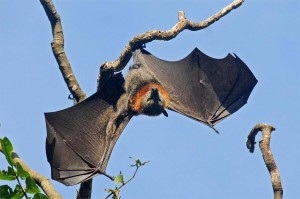 There are basically two broad types of bats found in Melbourne. These are the megabats (more commonly known as flying foxes or fruit bats) and the microbats (or insectivorous bats).
There are basically two broad types of bats found in Melbourne. These are the megabats (more commonly known as flying foxes or fruit bats) and the microbats (or insectivorous bats).
It is common for bats to be injured when they are tangled on barbed wire, caught in fruit netting or caught by cats.
DO NOT HANDLE ANY BAT. All bats can potentially be infected with a rabies-like virus called Lyssavirus. Only people vaccinated against this virus should handle bats. More information about Lyssavirus is available here.
While waiting for a bat to be rescued, if safe to do so, cover it with a towel or blanket to reduce stress, prevent injury and protect it from the sun. Contain the bat if possible without handling it.
Do not give the animal any food or water.
If you are bitten or scratched by a bat it is recommended the wound is not scrubbed. Wash the wound thoroughly with soap and water. If available an antiseptic with anti-viral action such as povidone-iodine (e.g. Betadine) should be applied after washing. If you get bat saliva in your eyes, nose or mouth, the area should be flushed thoroughly with water. Contact your doctor or hospital immediately.
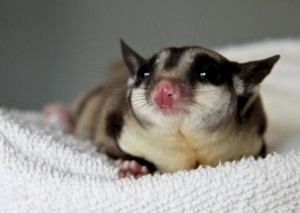 Possums and gliders may be creatures of the night but they will often fall foul of motor vehicles and cats.
Possums and gliders may be creatures of the night but they will often fall foul of motor vehicles and cats.
If you find an dead or injured possum or glider on the road be sure of your own safety before stopping to help. Beware of sharp claws and teeth if trying to handle one of these animals. Large Brushtail Possums can be particularly dangerous and can give a nasty bite or scratch.
If the animal is dead it is important to remember these are marsupials and so always check the pouch of females for live young. If the joey (young possum or glider) is furless do not forcibly remove it from the mother’s teat as this will cause further damage. If the mother is dead and you are comfortable doing so cut the teat as close to mother’s pouch a possible. If not then just transport the dead mother with the joey to the closest veterinary hospital. Hypothermia is a serious risk to these joeys and so keeping them warm with blankets, towels and heat packs is vital.
Do not attempt to give the joey any food or water.
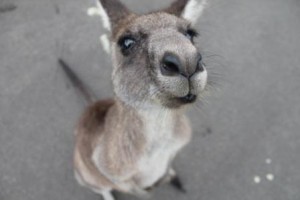 Like their smaller marsupial cousins the possums and gliders, kangaroos and wallabies are common wildlife cases seen at veterinary clinics.
Like their smaller marsupial cousins the possums and gliders, kangaroos and wallabies are common wildlife cases seen at veterinary clinics.
Stress is a major problem when dealing with these species and so a towel or blanket should be placed over their eyes to reduce external stimulation and lower stress levels.
Injured kangaroos can be quite aggressive so always approach them carefully and from behind so they cannot kick you.
Assisting furless joeys is performed in exactly the same way as described above for possum and glider joeys.
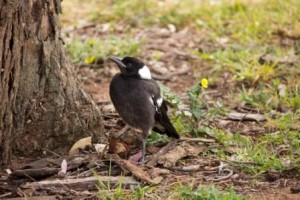 Wild birds are one of the most common types of wildlife presented to veterinary practices and wildlife organisations. Unfortunately many of them are either hit by cars or attacked by domestic pets.
Wild birds are one of the most common types of wildlife presented to veterinary practices and wildlife organisations. Unfortunately many of them are either hit by cars or attacked by domestic pets.
When dealing with an injured bird beware of sharp claws and beaks. Use an old towel or blanket to catch the bird rather than bare hands as this reduces stress on the bird and the likelihood of injury to both the bird and person.
Injured birds should be kept in a well ventilated box that confines it and stops it from flapping its wings to prevent further injuries.
Baby birds are often not in need of rescuing and should be left alone. Many baby birds are in fact “kidnapped” by well-meaning people. This is particularly so for baby Magpies. It is an old wives tale that the parent birds will reject the babies if they are touched by humans. Try and identify the parent bird and nest if possible. If the nest is found simply place the baby bird back in the nest if possible. If no nest is obvious or is out of reach but the parent birds are visible then observe from a distance. If the parent birds tend to the baby then leave it where it is.
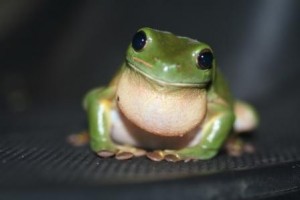 Frogs may be injured inadvertently when gardening, attacked by cats and often they are found in fruit and vegetables purchased at supermarkets. These so called “banana box” frogs have been transported on the food from farms further north of Melbourne.
Frogs may be injured inadvertently when gardening, attacked by cats and often they are found in fruit and vegetables purchased at supermarkets. These so called “banana box” frogs have been transported on the food from farms further north of Melbourne.
Before handling a frog ensure your hands are clean and free from any chemicals. Frog’s skin is very sensitive and will absorb chemicals it is exposed to. Ideally wear wet gloves when handling frogs.
Never relocated a frog that you have found. A fatal fungal disease called Chytridiomycosis has killed off many populations of frogs across the planet. One of the ways it is spread is by well-meaning people releasing infected frogs into otherwise clean environments.
Gently place any injured or found frog is a small, plastic container with a well secured lid and pour a small amount of water in the bottom to prevent the frog from becoming dehydrated.
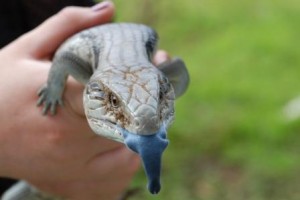 Australia is home to one of the largest and most diverse populations of reptiles on the planet. It should be remembered this includes some of the most deadly of snakes as well!
Australia is home to one of the largest and most diverse populations of reptiles on the planet. It should be remembered this includes some of the most deadly of snakes as well!
Do not handle any snake unless experienced or trained to do so. If you have found a snake contact one of the above wildlife organisations and they will instruct you what to do. This will likely involve getting in touch with a professional snake catcher.
If you have found an injured lizard or turtle gently and carefully place it in a secure box before transporting it to us to be assessed. Karingal Veterinary Hospital has a dedicated team of veterinarians with a special interest in reptiles and amphibians. They are some of the most experienced veterinarians in the country when it comes to treating these types of animals.